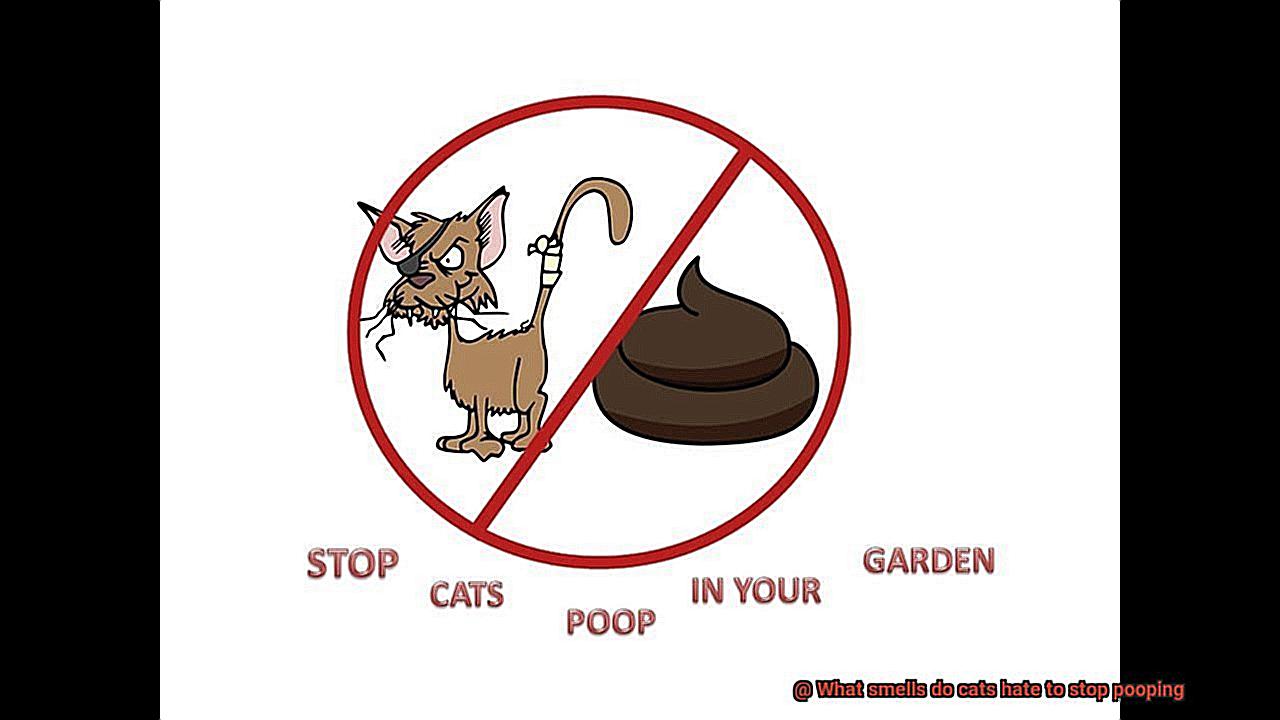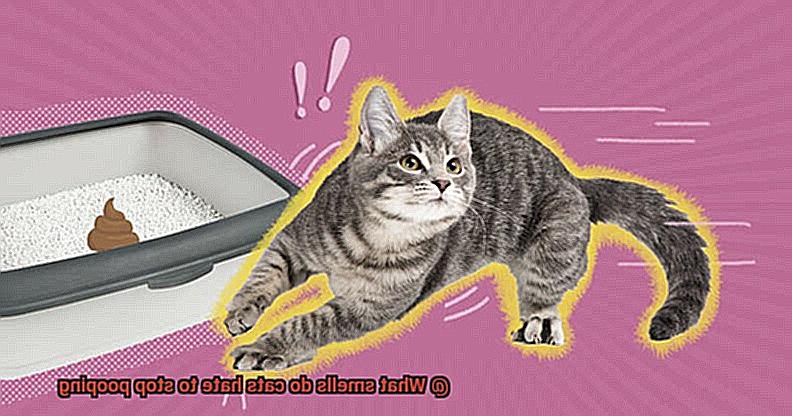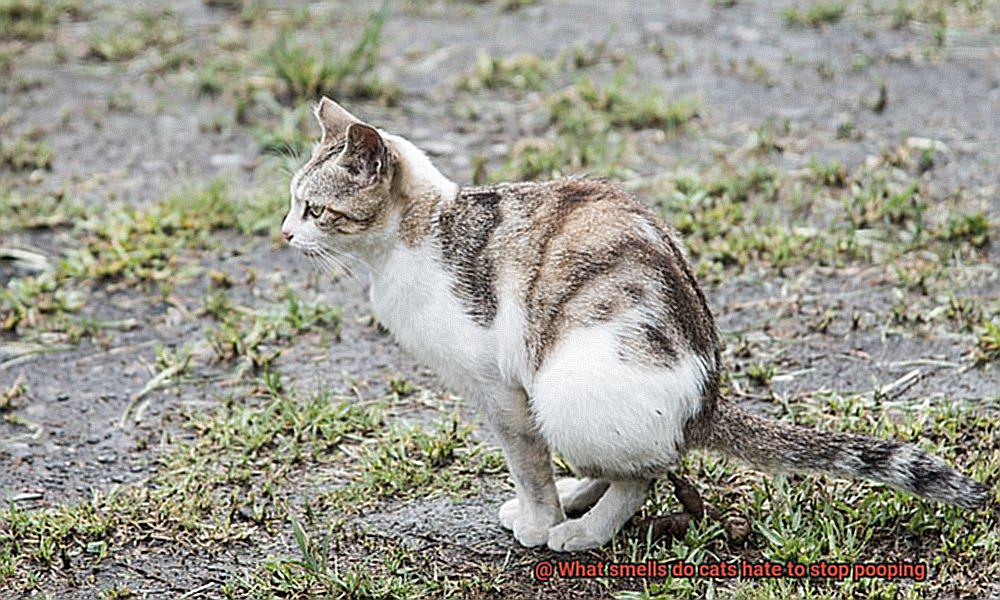Cats are undoubtedly one of the most loved pets around the globe. Their cute faces, playful nature, and independent personalities make them perfect companions. However, dealing with their poop can turn out to be quite a daunting task. Whether you have a new kitten or an aging cat, knowing what smells your feline friend dislikes can be a real game-changer when it comes to potty training.
Have you ever found yourself pondering over the question, “What smells do cats hate to stop pooping?” Well, fret not. You’re not alone in this struggle. Many cat owners face litter box issues, and the key to resolving them lies in understanding what your cat dislikes. While most cats are naturally neat creatures, some felines can be particular about their bathroom habits. Fortunately, there are certain smells that cats find unpleasant, and these can help you prevent your cat from pooping outside of their litter box.
In this informative blog post, we will explore the smells that cats hate and how you can use them to encourage your cat to use their litter box effectively. We’ll delve into scents such as citrus, lavender, and vinegar and provide practical tips on using them efficiently. So whether you’re a novice pet owner struggling with potty training or someone who has been grappling with litter box issues for years – this post is tailor-made for you. Keep reading to discover how you can transform your cat’s litter box into an alluring spot for them to do their business.
What Smells Do Cats Dislike?
While their keen nose helps them navigate and communicate, certain scents can also make them feel uncomfortable or even repelled. If you’re struggling with your cat’s litter box habits, it’s essential to understand what smells they dislike, so you can create a safe and pleasant environment that discourages them from pooping in unwanted areas.

Citrus is one of the most common scents that cats hate. The strong aroma of oranges, lemons, grapefruits, or limes can be too overwhelming for cats and make them avoid certain areas. You can use this to your advantage by using citrus-scented sprays or essential oils to deter your cat from pooping on your furniture or carpet. However, be cautious not to overdo it, as too much citrus can irritate your cat’s sensitive nose and cause them stress.
Another scent that cats dislike is vinegar. The acidic smell of vinegar may not be pleasant for humans either, but it’s an effective way to discourage your cat from pooping in specific areas. Mix vinegar with water in a spray bottle and use it to clean the spots where your cat has had accidents before. This will leave a lasting reminder for your cat to avoid that area next time.
Cats also tend to dislike the smell of mint, eucalyptus, and other essential oils. These strong odors can be overwhelming for cats and cause them discomfort or even respiratory problems if used excessively. However, you can use these scents in moderation to create a pleasant aroma in your home that also repels your cat from pooping in unwanted areas.
Other smells that cats dislike include ammonia, mothballs, cayenne pepper, and coffee grounds. These scents can be too strong or pungent for cats and make them feel uneasy or anxious. While they can be effective at keeping cats away from certain areas, you should be cautious when using these substances around your cat as they can also be toxic or harmful if ingested.
Citrus
Cats have a highly sensitive sense of smell, and they tend to avoid scents that are unpleasant to them. That’s where citrus comes in – the aroma of citrus fruits like oranges, lemons, and grapefruits can be too overpowering for cats and cause them discomfort.
So how can you use citrus to deter your cat from unwanted areas? One option is to try using citrus-scented sprays or diffusers in those areas. These sprays contain natural citrus oils that are safe for cats but strong enough to make them avoid the space.
Another option is to place citrus peels or slices around the area. The smell of the citrus will act as a natural deterrent, and your cat will be less likely to approach the spot.

But here’s the thing: while citrus can be effective, it may not work for every cat. Some felines may not find the scent of citrus unpleasant at all, while others may be more sensitive to it. Additionally, using too much citrus can actually overwhelm cats and cause adverse reactions like vomiting or diarrhea.
That’s why it’s crucial to use citrus in moderation and monitor your cat’s behavior closely when introducing new scents into their environment.
Vinegar
This household staple is known for its pungent aroma that can discourage cats from returning to their “favorite” spots.

To use vinegar as a deterrent, dilute it with water and spray it around the area where your cat has been pooping. But before you start spraying, do a small patch test to make sure the solution won’t damage surfaces. And while vinegar is an excellent deterrent, it’s crucial to avoid spraying it directly on your cat or using it as a cleaning solution for their litter box – this can be harmful to their health.
It’s worth noting that while vinegar may work for some cats, it won’t be effective for all. Some cats are unfazed by the smell, while others may even find it appealing. Therefore, it’s essential to address the root cause of why your cat is choosing to poop in unwanted areas. Is their litter box dirty or overcrowded? Are there other environmental factors at play?
Herbs

Luckily, certain herbs can be used to repel cats from those areas and help keep your home clean and odor-free.
Rosemary is one such herb that cats tend to avoid due to its strong scent. Whether you choose to use it in the form of a spray or plant it in pots around the house, not only will rosemary keep your house smelling fresh, but it also has many health benefits for humans such as improving memory and reducing stress.
Lavender is another herb that has a calming effect on humans but an overwhelming effect on cats. Using lavender oil in a diffuser or placing dried lavender in areas where cats tend to poop can help keep them away while making your home smell like a relaxing spa.
Citrus fruits like oranges and lemons are also effective in deterring cats from pooping in certain areas. The strong citrus scent can be too overpowering for cats, causing them to avoid areas where these scents are present. You can place citrus peels around gardens or in litter boxes to keep cats at bay.
While catnip may seem like a natural choice for deterring cats, it can actually have the opposite effect when it comes to their bathroom habits. Catnip can make cats feel more comfortable and relaxed, which may lead them to use the litter box more often. So, skip the catnip when trying to deter them from unwanted areas.
It’s essential to note that while these herbs may work for some cats, they may not work for all. Finding the right solution for your specific feline friend may take some trial and error. Additionally, addressing the root cause of their behavior, such as ensuring their litter box is clean and comfortable, is crucial.
How to Use Smells to Discourage Pooping Outside the Litter Box
Here, we will delve deeper into five subtopics on how to use smells to discourage pooping outside the litter box.
Citrus
Cats have a natural aversion to citrus fruits such as oranges and lemons, making citrus scents an effective way to deter them from pooping outside the litter box. You can place fruit peels in a dish or hang them near the area where your cat tends to poop. Alternatively, try using citrus-scented sprays or air fresheners.
Vinegar
Vinegar is another scent that cats dislike, and it can be used as a deterrent by mixing equal parts of water and white vinegar in a spray bottle and spraying it around areas where your cat has been pooping outside of the litter box. However, it’s important to note that vinegar should not be sprayed directly on cats as it can be harmful to their skin.
Herbs
Certain herbs such as lavender, rosemary, and eucalyptus have strong scents that cats tend to dislike. Essential oils or dried herbs can be used to create a natural repellent by sprinkling them in areas where your cat tends to poop or using an essential oil diffuser to spread the scent throughout your home.
Commercial Products
There are also commercial products available on the market designed specifically for deterring cats from pooping outside the litter box. These products contain scents that are unpleasant to cats such as cinnamon, cayenne pepper, and mustard oil.
Experimentation
It’s important to keep in mind that not all cats will respond to the same smells. Some cats may not be bothered by certain scents and may continue to poop outside of the litter box regardless. Therefore, it’s essential to experiment with different smells and methods until you find what works best for your cat.
Benefits of Using Smells to Stop Pooping
Look no further than using smells as a deterrent. Not only is it a safe and natural method, but it also has numerous benefits.
Using smells to stop pooping is a non-toxic and environmentally friendly method. Unlike other methods that involve chemicals or sprays, smells are natural and do not harm cats or the environment. This gives cat owners peace of mind knowing that they are not exposing their furry friends to harmful substances.
One of the biggest advantages of using smells to deter cats from pooping is that it’s cost-effective. Most of the scents that cats dislike can be found easily at home, such as citrus fruits, vinegar, and coffee grounds. This means that you won’t have to spend a lot of money on expensive products or services.

Moreover, using smells to stop pooping is incredibly easy to use. Simply place the smell in the area where you do not want your cat to poop, and the cat will avoid it. It’s a hassle-free method that requires minimal effort and can save you a lot of time in the long run.
This method is also versatile, as there are various smells that cats dislike. You can experiment with different smells until you find what works best for your cat. Peppermint oil, eucalyptus oil, or even certain herbs like lavender or rosemary are all great options.
Lastly, using smells to deter cats from pooping creates no mess. Unlike other methods that involve cleaning up after your cat has already pooped in an unwanted area, using smells prevents this from happening in the first place.
Potential Drawbacks of Using Smells to Stop Pooping
The idea of using smells to deter them may seem like a natural and cost-effective solution, but it’s important to understand the potential drawbacks before giving it a try.
One major concern is that not all cats will be affected by the same smell. Every cat has their own unique preferences and aversions when it comes to scents. What may work for one feline friend may not work for another, so prepare yourself for some trial and error to find the right scent that will deter your cat from doing their business in unwanted areas.
Another thing to keep in mind is that some odors that are unpleasant to cats may also be harmful to their health. Essential oils such as tea tree oil or eucalyptus oil can be toxic to cats if ingested or absorbed through their skin. Before using any scent around your cat, it’s crucial to do your research and make sure it’s safe for them.
Furthermore, using smells to stop pooping may only provide a temporary solution. Cats are intelligent creatures and can quickly adapt to changes in their environment. If they become accustomed to a particular scent, they may no longer be deterred by it and continue their business in unwanted areas.
Lastly, relying solely on smells may not address the underlying issue of why your cat is pooping outside of their litter box. It could be due to a medical issue or behavioral problem such as stress or anxiety. Therefore, it is essential to rule out any medical issues and address any behavioral concerns before attempting to solve the problem with scents.
Alternatives to Using Smells to Stop Pooping
While using smells can seem like an easy solution to deter cats from pooping, it’s not always effective or safe for your furry friend. Luckily, there are alternative methods to train your cat to use their designated litter box.
One effective alternative is to use textures that cats dislike. Cats have sensitive paws, so placing aluminum foil, double-sided tape, or sandpaper in the area where your cat tends to poop can discourage them from using that spot. By using these textures, you can train your cat to avoid certain areas and instead use their litter box.
Another option is to create a designated litter box area for your cat. Choose a location that your cat prefers, such as a quiet corner, and make sure the litter box is clean and accessible at all times. By providing a designated area for your cat’s bathroom needs, they are less likely to use other areas of your home.

In addition, providing your cat with adequate stimulation and exercise can also reduce their desire to poop outside of their litter box. Boredom or understimulation can cause cats to act out and use other areas of your home as their bathroom. By offering toys, scratching posts, and interactive playtime, you can keep your cat entertained and mentally stimulated.
rK5JavuFEJo” >
Conclusion
In conclusion, knowing which smells cats hate can be a game-changer when it comes to potty training your feline friend. By using scents like citrus, vinegar, lavender, or rosemary in moderation, you can discourage your cat from pooping outside their litter box.
The beauty of using smells is that it’s a safe and natural method that won’t break the bank. It’s also incredibly versatile, allowing you to experiment with different scents until you find the perfect one for your kitty. Plus, there’s no mess involved, and it’s eco-friendly too.
However, it’s important to remember that not all cats will react the same way to certain smells. Some scents may even be harmful or toxic to them if used excessively. Additionally, relying solely on smells may not address the underlying cause of why your cat is avoiding their litter box.
That said, there are other methods worth considering such as creating a designated litter box area or using textures that cats dislike. Providing adequate stimulation and exercise can also reduce your cat’s desire to poop outside their litter box.
By getting to the root of the issue and addressing it head-on, you’ll create a safer and happier environment for both you and your furry companion.







